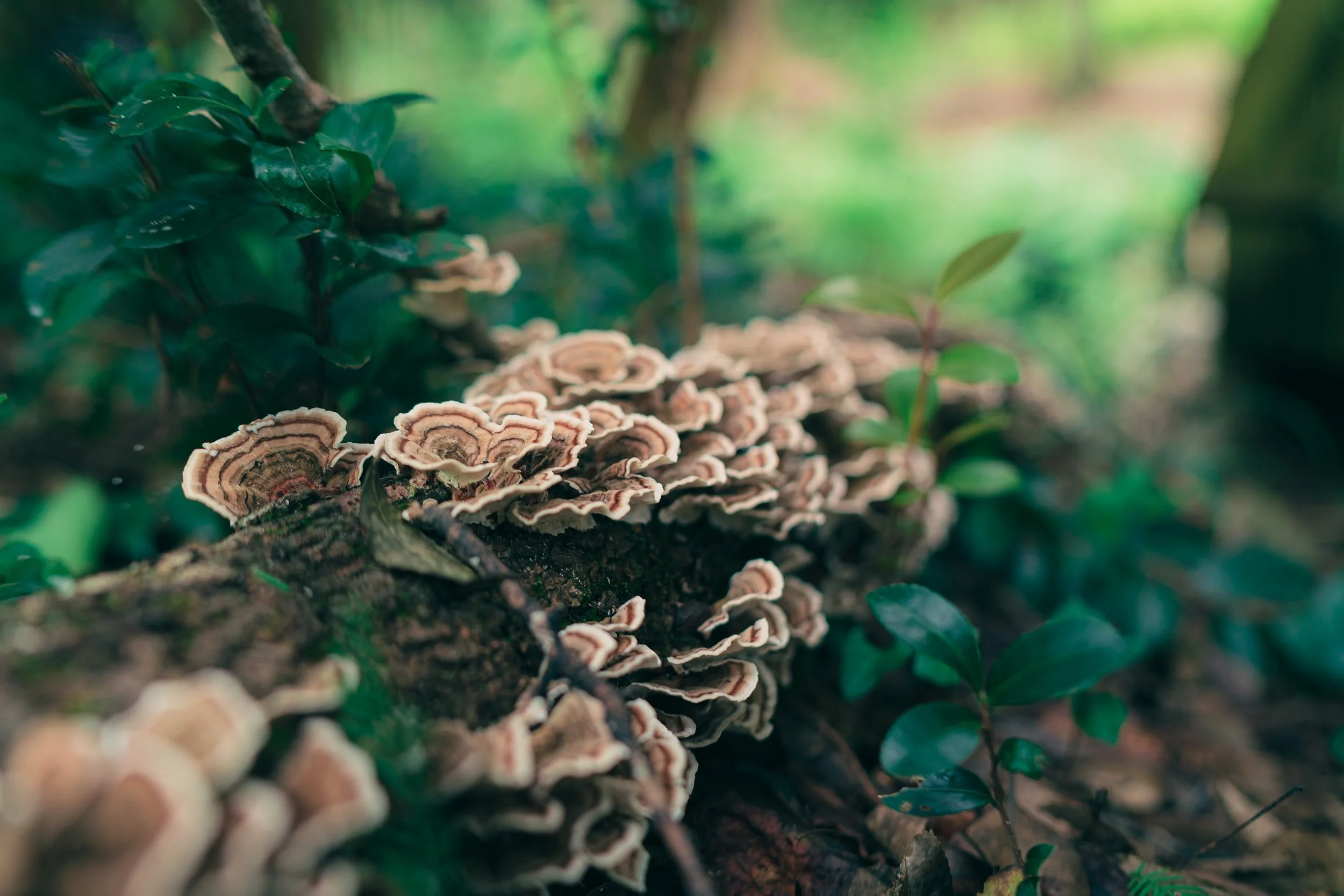The Joy of Mushrooms - part 2.
This is part two of a two part blog series on mushrooms and how they can be used as part of an integrative approach to a variety of diseases seen in animals. Let’s look at a few of the mushrooms mentioned in the previous article in a little more detail.
Reishi (Ganoderma lucidum) - Reishi is known as the mushroom of immortality (bet that got your attention!). It is a powerful medicinal mushroom that has been used for thousands of years in Chinese medicine. It is NOT a culinary mushroom (many medicinal mushrooms are also culinary ones) and it is worth bearing in mind that it can have anticoagulant effects, so should probably be avoided in patients with clotting problems, or those on medications that could affect their clotting. In Chinese medicine, it is usually given as a hot water decoction (ie a tea) - this is very bitter and tastes horrid! It has anti-tumour effects, anti-inflammatory effects, anti-viral effects and, as all mushrooms do, immune modulating properties. It can be used for cancer, kidney disease (both acute and chronic kidney disease, and ischaemic and inflammatory protein losing kidney disease), liver disease ( a study on rats in Taiwan demonstrated a reversal of liver fibrosis), immune modulated disease, neurological disease (it has been shown to be of benefit in epilepsy in mouse models, and to help with Alzheimers), chronic infection (cat flu for example) and as an adjunct to chemotherapy (please check that your vet or veterinary oncologist is comfortable with this if you are considering using it).
Cordyceps (Cordyceps sinensis) - Cordyceps is known as the caterpillar fungus because it grows in/on - and out - of caterpillars! Wild ones are very expensive, and there is now a sustainability issue with wild Cordyceps as a consequence over over harvesting - it is now considered endangered by CITES. So cultivated cordyceps is the way to go, from a sustainability perspective and also from a cost perspective. Cordyceps can be super for respiratory conditions, even in chickens! Cordyceps contains cordyceptin, which seems to have good anticancer properties, and is found mainly in the mycelium as opposed to the fruiting body of the mushroom. Cordyceps can be used for lung disorders, geriatric support, cancer, kidney disease, recovery from disease or exhaustion (it seems to increase ATP production - the energy of our cells). It does promote testosterone and other steroid hormones, which may be worth noting for any hormonally dependent conditions/cancers.
Turkey tail mushroom (Coriolus or Trametes versicolor) - probably the most widely used anti-cancer mushroom used in dogs, partly because of the University of Penn State study from 2012 that looked at using a turkey tail mushroom extract in dogs with haemangiosarcoma. This research did find an increased survival time that was dose dependent in dogs that took Turkey tail mushroom extract, however it is worth saying that this research only consisted of a small number of dogs. However, given the safety index of turkey tail mushroom, I wouldn’t hesitate to give my own dog turkey tail mushroom if she developed haemangiosarcoma. And PSP -the polysaccharide extract used - has been approved as an anticancer drug in Japan and China, whilst PSK is used under the commercial name Krestin as an anticancer drug. This mushroom is not just good for cancer however, it could also be of benefit in patients with immune deficiency, liver disease, old ages, and IBD amongst others.
Lions Mane (Hericium erinaceus) - this was traditionally used as a gastroprotective mushroom (support the stomach), but it is also considered a neuroregernative and neuroprotective mushrooms. It contains Erianicin, which stimulates nerve growth factor and reduces amyloid deposition, making it potentially beneficial in neurodegenerative conditions and Alzheimers. We know that Canine Cognitive Dysfunction has a similar pathological process to Alzheimers, and so for those golden oldies showing signs of cognitive dysfunction, Lions mane could be a lovely mushroom choice for adjunct support.
Shiitake mushrom (Lentinula edodes) - this an edible mushroom which in Japan is also considered an elixir of life, possessing the ability to enhance vital energy and cure colds. Lentinan is a polysaccharide from Shiitake mushrooms that is used as an extract in cancer treatment in humans. Ertadenine is a polysaccharide that lowers cholesterol, removes lipids and improves circulation.This mushroom is considered an antioxidant, anticancer, antibacterial and anti-viral, anti-aging, anti-inflammatory and immunmodulatory (as we are seeing with all mushrooms) as well as being supportive of the kidneys and liver. It can be used for pets with liver and kidney diseases, cancer support (thought there is more research for Reishi than Shiitake) and for chronic infections. The additional bonus us that they are really palatable - a delicious addition when cooked to food (though be aware that eating large amounts of raw Shiitake has been linked with causing ‘shiitake dermatitis’ in humans).
Safety
Whilst the data from several large scale clinical trials suggests that the side effects from mushrooms are minimal, care still needs to be taken when using mushrooms as a supportive treatment. Firstly, it is vital to ensure that the mushrooms are medicinal and that the ones used are the correct species - there are many mushrooms that are highly toxic. Mushroom products that are going to be used as a supplemental treatment should also be produced to good manufacturing practices (GMP) so that quality is assured. As with any substance, there can be allergic reactions, and if there is a history of confirmed or suspected mushroom allergy then these medicinal mushroom supplements may be best avoided. Reishi is not a culinary mushroom and can have an anticoagulant effect, so is not advised if you have a pet with bleeding issues.
Many medicinal mushrooms are also considered food sources, and in most cases there are no reported interactions with medications. In human medicine in Japan and China mushroom extracts are routinely prescribed alongside prescription drugs, particularly chemotherapy. However, do ensure that your holistic vet is aware of all medication that your pet may be on prior to starting any mushroom supplementation, so that any potential mushroom - drug interactions can be determined.
Hopefully this blog will have shown you the huge potential of medicinal mushrooms to be used to benefit our furry patients in a variety of ways. I would always advise using them under the direct guidance of an experienced herbal or holistic vet, or a vet with knowledge and experience of using medicinal mushrooms. They will not only be able to ensure safe use with the appropriate mushrooms, but also choose a product that has been manufactured to good manufacturing practice standards, with an appropriate choice of extract form for your pet and their health condition.

